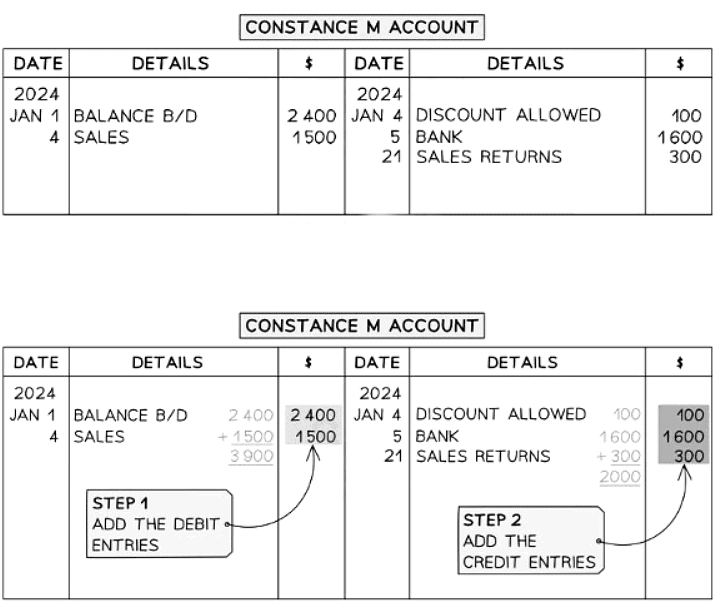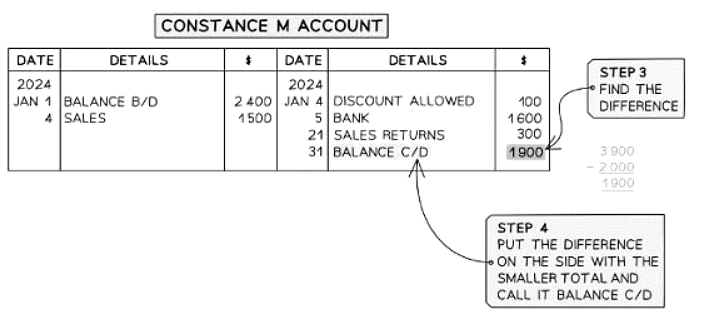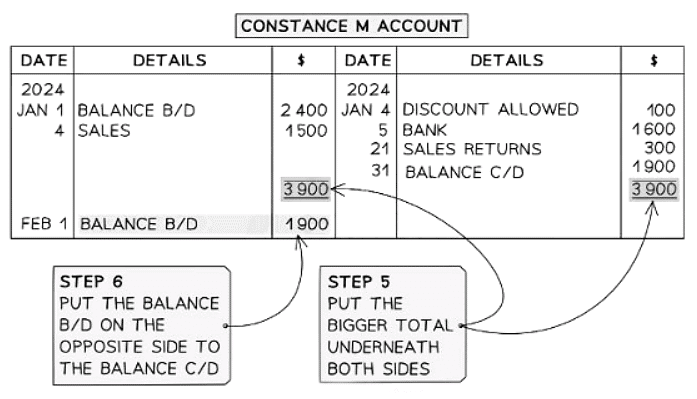Class 10 Exam > Class 10 Notes > Accounting for GCSE/IGCSE > Balancing Accounts
Balancing Accounts | Accounting for GCSE/IGCSE - Class 10 PDF Download
Balancing Accounts
Why do businesses balance their accounts?
- Businesses balance their accounts at regular intervals, usually at the end of a month.
- By balancing accounts, businesses aim to:
- Keep the accounts accurate
- Track the current balance of an account
- Enable managers to monitor progress
How to Maintain a Balanced Ledger Account
- Step 1: Calculate the total of debit entries
- Step 2: Calculate the total of credit entries
- Step 3: Determine the variance between the two totals
- Step 4: Record an entry for the variance on the side with the smaller total. Date this entry as the final day of the period, typically the month-end. This entry is known as "balance c/d" (carried down).
- Step 5: Update the new totals on both sides of the account, ensuring they align. Draw a single line above and a bold or double line below the totals.
- Step 6: Make an entry of equal value to the balance c/d but on the opposite side after the totals. Date this entry as the first day of the next period, usually the beginning of the month. This entry is termed "balance b/d" (brought down).
Question for Balancing AccountsTry yourself: Why do businesses balance their accounts?View Solution
Example of balancing a trade receivable account



The document Balancing Accounts | Accounting for GCSE/IGCSE - Class 10 is a part of the Class 10 Course Accounting for GCSE/IGCSE.
All you need of Class 10 at this link: Class 10
|
21 videos|26 docs|12 tests
|
FAQs on Balancing Accounts - Accounting for GCSE/IGCSE - Class 10
| 1. How can I maintain a balanced ledger account in Cambridge IGCSE Accounting? |  |
Ans. To maintain a balanced ledger account in Cambridge IGCSE Accounting, you need to ensure that the total of the debit side equals the total of the credit side for each account. This can be done by recording all transactions accurately, including debits and credits, and regularly reconciling the account to identify and correct any errors.
| 2. What does "Balance Brought Down (b/d)" mean in accounting? |  |
Ans. "Balance Brought Down (b/d)" in accounting refers to the balance of an account that is carried forward from the previous accounting period. It is the closing balance of the account at the end of the previous period, which becomes the opening balance for the current period.
| 3. How do I balance an account in Cambridge IGCSE Accounting? |  |
Ans. To balance an account in Cambridge IGCSE Accounting, you need to calculate the total of the debit side and the total of the credit side separately. Then, compare the two totals to ensure they are equal. If they are not equal, you need to identify and correct any errors in the account.
| 4. What are some accounting procedures overview in Cambridge IGCSE Accounting? |  |
Ans. Some accounting procedures overview in Cambridge IGCSE Accounting include recording transactions, preparing financial statements, reconciling accounts, and analyzing financial data. These procedures are essential for maintaining accurate and reliable financial records.
| 5. Why is it important to balance accounts in accounting? |  |
Ans. Balancing accounts in accounting is important because it ensures the accuracy and reliability of financial information. By balancing accounts, you can identify and correct errors, prevent fraud, and make informed financial decisions based on accurate data. It also helps in the preparation of financial statements and compliance with accounting standards.
Related Searches















